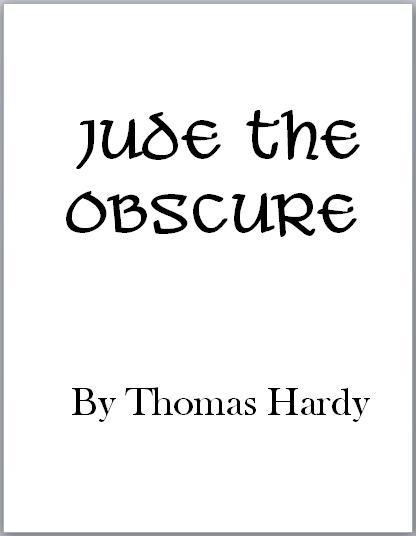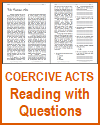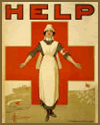| Jude the Obscure by Thomas Hardy eBook |
|---|
| www.studenthandouts.com ↣ Printable Texts ↣ Printable Fiction |
 |  |
|
Excerpt: Tears rose into the boy's eyes, for he was not among the regular day scholars, who came unromantically close to the schoolmaster's life, but one who had attended the night school only during the present teacher's term of office. The regular scholars, if the truth must be told, stood at the present moment afar off, like certain historic disciples, indisposed to any enthusiastic volunteering of aid. The boy awkwardly opened the book he held in his hand, which Mr. Phillotson had bestowed on him as a parting gift, and admitted that he was sorry. "So am I," said Mr. Phillotson. "Why do you go, sir?" asked the boy. "Ah–that would be a long story. You wouldn't understand my reasons, Jude. You will, perhaps, when you are older." "I think I should now, sir." "Well–don't speak of this everywhere. You know what a university is, and a university degree? It is the necessary hallmark of a man who wants to do anything in teaching. My scheme, or dream, is to be a university graduate, and then to be ordained. By going to live at Christminster, or near it, I shall be at headquarters, so to speak, and if my scheme is practicable at all, I consider that being on the spot will afford me a better chance of carrying it out than I should have elsewhere." The smith and his companion returned. Click here to print, download, or read online (PDF). |
|
Jude the Obscure by Thomas Hardy is a complex novel that explores various themes and messages, but one of its primary messages is the critique of societal and institutional constraints on individual aspirations and personal happiness. The novel tells the story of Jude Fawley, a working-class man with a strong desire for education and self-improvement, and his struggles against the rigid class and moral systems of Victorian society. Here are some key elements of the novel's primary message. Social Class and Aspiration: Jude aspires to become an educated scholar and to break free from his working-class background. He faces numerous obstacles and prejudices due to his social status, highlighting the limitations society places on individuals based on class. Educational Ambition: The novel underscores the importance of education as a means of personal growth and self-improvement. Jude's pursuit of knowledge is hindered by a lack of resources and opportunities. Marriage and Morality: Jude's relationships and marriages are marred by societal norms and moral expectations. His desire to marry Sue Bridehead, his cousin and intellectual equal, challenges the conventions of marriage and morality in Victorian society. Institutional Religion: The novel critiques the influence of organized religion, particularly the Church of England, on individuals' lives and choices. Jude's experiences with religious institutions are often oppressive and hypocritical. Sexuality and Repression: Jude the Obscure explores the sexual repression and double standards of the Victorian era. Characters like Sue and Arabella grapple with societal expectations related to their sexuality. Fate and Tragedy: The novel has a tragic tone, and its characters often seem powerless in the face of fate and circumstance. Their dreams and ambitions are thwarted by external forces, emphasizing the futility of individual efforts in the face of societal constraints. Critique of Marriage: Hardy critiques the institution of marriage as a source of suffering and unhappiness for some characters. Jude's marriages and relationships are fraught with conflict and misery. Dissatisfaction with the Status Quo: Through Jude's character, the novel expresses dissatisfaction with the status quo and the limitations placed on individuals by societal norms, institutions, and traditions. Irony and Paradox: The novel employs irony and paradox to highlight the contradictions and absurdities in Victorian society's moral and social codes. Tragic Vision: Jude the Obscure presents a bleak and tragic view of life, where characters often experience suffering and disillusionment. It challenges the idea of a just and fair world. In summary, Jude the Obscure by Thomas Hardy is a novel that primarily conveys a message of critique and rebellion against the societal and institutional constraints that limit individual aspirations, personal happiness, and the pursuit of knowledge and self-improvement. It explores the tension between individual desires and societal expectations, often with tragic consequences for the characters involved. |
 |
| www.studenthandouts.com ↣ Printable Texts ↣ Printable Fiction |










